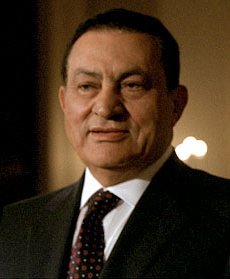 Ousted leader Hosni Mubarak
Ousted leader Hosni Mubarak
CAIRO (AP) -- Tens of thousands of Egyptians braved scorching summer heat to hold one of their biggest protests in months Friday, filling streets in Cairo and other cities to demand trials for members of Hosni Mubarak's regime and express frustration with the slow pace of change.
The exhilaration of Mubarak's ouster on Feb. 11 after 18 days of mass protests has yielded to widespread frustration that "the revolution" has stalled. The economy remains sluggish and many are confused about what comes next. Some are demanding that the country's military rulers, who took power after Mubarak, push back parliamentary elections set for September because most political factions are not ready.
Many complain that although Mubarak and many hated figures under him have lost power, the key elements of his regime remain in the judiciary, the police and the civil service.
Doubts have also begun to grow about the council of ruling generals, which has faced protests and riots for what some see as its reluctance to prosecute police and former regime officials accused of complicity in the killing of nearly 900 protesters during the uprising.
"The military council is being wishy-washy," said protester Mohammed al-Tayyib in Cairo's Tahrir Square, the epicenter of the uprising that toppled Mubarak. "No one is being brought to trial and nothing is moving."
Earlier this week, seven policemen in the city of Suez were freed on bail during their trial for the killing of the protesters. Their release set off two days of riots by angry families who accused the judiciary of corruption. Other former regime officials were acquitted on corruption charges, also raising the ire of many.
"Things are going in the wrong direction," said protester Lilian Wagdy. She complained of the many civilians convicted by military courts while trials of security officials are often postponed or release the accused.
In scenes reminiscent of the 18 day uprising, civilian checkpoints were erected around Tahrir to prevent thugs from mixing in with demonstrators and potentially causing violence since no police or military were in the area.
Banners fluttered in the wind and a large white cloth had the words "Retribution from the killers of martyrs" painted on it. Fliers read: "Real cleansing. Real government. Real trials."
Crowds clustered under an improvised canopy and sought shade under blankets and placards. Wandering merchants sold cold water and ice cream. Egypt's Health Ministry said ambulances carried 54 people from the square by mid-afternoon, most of them suffering from heat exhaustion.
With the rally, dubbed "Friday of Accountability," organizers were seeking to restore some unity in Egypt's protest movement, which has fragmented since Mubarak's fall. The Muslim Brotherhood, Egypt's most organized political group, and ultraconservative Salafis decided to join the protests after staying away from others in past weeks.
The theme of justice allowed the various factions to patch over for the moment differences over the transition. Many liberal and secular activists demand that the ruling military push back the parliament elections, saying political parties can't be ready in time for September.
The Muslim Brotherhood, which is the best prepared for the race, strongly opposes any delay.
The secretive council of generals in power has so far refused any postponement, but it has also failed to set an exact date for the election or start preparations for holding it - increasing the confusion and disenchantment with what some see as the military's mismanagement of the transition.
To ramp up pressure, protesters said Friday's demonstration would launch an open-ended sit-in until their demands are met. It was not clear if that would go ahead but dozens of tents were erected in the Cairo square.
"The military council makes decisions when we are here. When we were silent, nothing happens," said Mona Farag, 45, who said her three sons were planning to remain in the square.
She expressed a common frustration with the military rulers, whose tendency to communicate mostly through messages on their Facebook page has led many to see them as aloof and out of touch.
"We are going to stay here until someone from the military council comes out and tell us what's going on," she said.
Protesters also massed Friday at main squares in Suez and Alexandria, the two coastal cities that have also witnessed violent clashes between security forces and protesters during the uprising. In Alexandria, protesters carried a large cloth with the colors of the Egyptian flag; and a large banner on the seaside read: "Retribution."
In Suez, a man fired a gunshot toward the rally and was detained by organizers, said a witness, Ahmed Khafagi.
In the southern city of Assiut, hundreds of protesters set up a tent camp in a main city square to prepare for a sit-in for the first time in the conservative south.
In an unusual show of anger in southern Egypt, the protesters chanted against the military council, which is led by Field Marshal Mohammed Hussein Tantawi.
"They removed and brought the field marshal. That means there is no change," the protesters shouted.
In the Red Sea resort of Sharm el-Sheikh, scores of protesters gathered outside the hospital where Mubarak is under arrest, demanding to see proof that he is inside. "Hosni, Get Out!" the protesters shouted, amid tight security presence.
In an attempt to defuse public anger, a prosecutor on Thursday charged 25 Mubarak-era officials with manslaughter, attempted murder and assault for their part in organizing a February attack on anti-regime protesters in which assailants on horses and camels charged into the crowds.
© 2011 The Associated Press. All rights reserved. This material may not be published, broadcast, rewritten or redistributed. Learn more about our Privacy Policy and Terms of Use.
Portland and Seattle
Free Subscription to Breaking News
Free Subscription to Breaking News



















































































































































































































































































































































